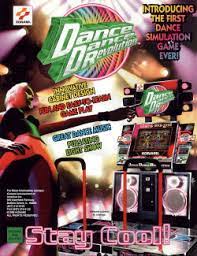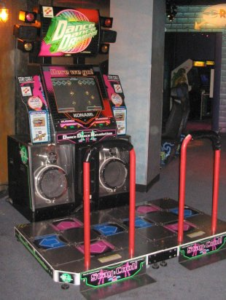Dansu Dansu Reboryūshon is a music-based arcade video game developed by Konami in 1998. Players have to use their feet to hit the corresponding pads underneath them, demonstrating a sort of “dance.” It challenges a player’s sense of rhythm more than their dancing skills. Hence, it falls under the Rythme category of the genre.
Rhythm games became recognized in the 1970s with games such as Ralph Baer’s Simon. In 1987, Nintendo utilized its Power Pad as a dance floor. Players would mimic the person on screen, occasionally requiring their hands. This similarity is uncanny to DDR and laid the foundation for the future of the rhythm genre.
DDR is a game that uniquely has its gamers use their feet. The objective is to move your feet in a certain pattern, usually following the beat of a song. Players have to use their balance, rhythm, strength, and lightness of foot in order to get a high score and beat the song.
 The game grades each of your steps by calling out “Perfect”, “Great”, “Good”, “Boo”, to “Miss”. The game ends either with the player making it through the song with their “Dance Gauge” still full, or missing too many steps and having their bar drop to 0. Players have a score of points, bonus points, and how many of each kind of step they made that come to a letter grade.
The game grades each of your steps by calling out “Perfect”, “Great”, “Good”, “Boo”, to “Miss”. The game ends either with the player making it through the song with their “Dance Gauge” still full, or missing too many steps and having their bar drop to 0. Players have a score of points, bonus points, and how many of each kind of step they made that come to a letter grade.
There are three different play styles: Single, Couple, and Double. Double is when there is one player using both pads. There are also three modes, easy, normal, and hard, which truly makes this a game for everyone.
Because of the easy rules and catchy songs, DDR became an arcade hit. It was highly successful in and out of Japan, its birthplace. According to Game Machine, DDR became the most-successful dedicated arcade game the month it came out. Its sequels were also acknowledged and very lucrative. It did not hit the US until 1999. Its success is attributed to the unique gameplay and the innovative connection between a stage and a player’s movement.
But could DDR be considered more than a video game? Even called exercise?
DDR primarily uses dance, hip-hop, and synthpop-based music. It’s upbeat, techno, and funky. It gets you moving and tapping your feet, even if you are playing. Sometimes, a good song can get you in a good mood. And for a game based on rhythm, music is everything. This key component of the mechanic helps the players achieve more points.
Many players use this game as an aerobic exercise. In 2007, the New York Times came out with a statement claiming that more than 1,500 US high schools planned to incorporate it into their PE programs. This makes sense if you focus on the more casual players who don’t focus too much on the score. These people will move around a lot, struggle and shrug it off still trying to hit the footpads correctly. More avid gamers use as little movement as possible and rely on the railing behind them for balance. This means they focus strictly on their steps and rhythm. There are also those players who “freestyle” and will select the easiest modes while adding more complicated movements in between steps, giving a more significant impression of a dance.
 As an exercise, it makes sense that you can burn a decent amount of calories playing the game. As an exercise fanatic, I can admit that this game creates a more dynamic and free-spirited type of workout, rather than a hardcore gym sesh that has you barely feeling your legs. Since I have only played the arcade version on occasion (and not on a regular basis), I would not know how effective strictly playing DDR is to weight loss. After some research, I found a woman who claims she “lost 35 lbs during [her] first 4 months playing DDR.” Using her experience, DDR benefitted her more than a gym because of how it captures its player’s focus.
As an exercise, it makes sense that you can burn a decent amount of calories playing the game. As an exercise fanatic, I can admit that this game creates a more dynamic and free-spirited type of workout, rather than a hardcore gym sesh that has you barely feeling your legs. Since I have only played the arcade version on occasion (and not on a regular basis), I would not know how effective strictly playing DDR is to weight loss. After some research, I found a woman who claims she “lost 35 lbs during [her] first 4 months playing DDR.” Using her experience, DDR benefitted her more than a gym because of how it captures its player’s focus.
But, can DDR replace the gym? Of course not! It might provide great aerobics exercises and good cardio, but your body needs so much more than that. It can replace exercise but not a routine. Playing DDR as your only form of exercise for the rest of your life will not get you too far in your fitness journey. Just as you wouldn’t want to skip leg day, you cannot skip those push and pull days.
